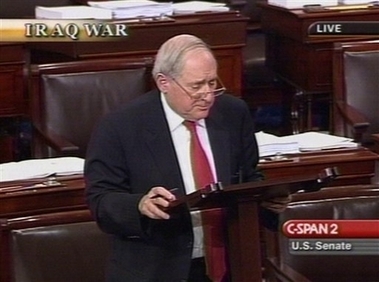US Congress OKs billions for the Iraq war
(AP)Updated: 2007-05-25 09:01
WASHINGTON - Bowing to President Bush, the Democratic-controlled Congress grudgingly approved fresh billions for the Iraq war Thursday night, minus the troop withdrawal timeline that drew his earlier veto.
The Senate vote to send the legislation to the president was 80-14. Less than two hours earlier, the House had cleared the measure, 280-142, with Republicans supplying the bulk of the support.
Five months in power on Capitol Hill, Democrats in both houses coupled their concession to the president with pledges to challenge his policies anew. "This debate will go on," vowed House Speaker Nancy Pelosi , and if anything, Senate Majority Leader Harry Reid of Nevada was more emphatic.
"Senate Democrats will not stop our efforts to change the course of this war until either enough Republicans join with us to reject President Bush's failed policy or we get a new president," he said.
From the White House to the Capitol, the day's events closed out one chapter in an epic struggle pitting Congress against commander in chief over a war that has claimed the lives of more than 3,400 US troops.
House Republican leader John Boehner of Ohio choked back tears as he stirred memories of the terror attacks of Sept. 11, 2001. "After 3,000 of our fellow citizens died at the hands of these terrorists, when are we going to take them on? When are we going to defeat them," he asked.
The legislation includes nearly $95 billion to pay for the wars in Iraq and Afghanistan through Sept. 30. In addition to jettisoning their plan for a troop withdrawal timeline, Democrats abandoned attempts to require the Pentagon to adhere to troop training, readiness and rest requirements unless Bush waived them.
The bill establishes a series of goals for the Iraqi government to meet as it strives to build a democratic country able to defend its own borders. Continued US reconstruction aid would be conditioned on progress toward the so-called benchmarks, although Bush retains the authority to order that the funds be spent regardless of how the Baghdad government performs.
In a highly unusual maneuver, House Democratic leaders crafted a procedure that allowed their rank and file to oppose money for the war, then step aside so Republicans could advance it. There were 194 Republicans in favor, as well as 86 Democrats, three members of the leadership among them. Pelosi and 139 other Democrats voted against the measure, as did two Republicans.
Moments earlier, the House voted 348-73 to include a separate package of domestic spending that Bush had once resisted.
After months of struggle with the White House, Democrats took credit for forcing Republicans to begin changing course. At the same time, they emphasized their distaste for enabling the money to advance.
"I hate this agreement," said Rep. David Obey , D-Wis., chairman of the House Appropriations Committee, who played a key role in talks with the White House that yielded the measure.
He voted against the money, but Sen. Carl Levin , D-Mich., no less an opponent of the conflict, cast a different vote.
"I cannot vote ... to stop funding for our troops who are in harm's way," said Levin, chairman of the Senate Armed Services Committee. "I simply cannot and I will not do that. It is not the proper way that we can bring this war to an end."
Presidential politics spiced the proceedings across the Capitol.
Sen. Christopher Dodd of Connecticut, alone among the Senate's Democratic White House hopefuls, pledged in advance to oppose the bill. Sen. Joseph Biden of Delaware said he supported it.
That left Sens. Hillary Rodham Clinton of New York and Barack Obama of Illinois publicly uncommitted in the hours leading to the vote, two leading White House rivals tugged in one direction by the needs of 165,000 US troops - and in another by party activists demanding rejection of the legislation. As time ran out on the roll call, first he, then she, voted no.
After the previous bruising veto battle, Democratic leaders said they hoped to clear the bill for Bush's signature by this Memorial Day weekend. The president rejected an earlier measure, objecting to a troop withdrawal timetable, and the House failed to override his objection.
In exchange for providing the war money on Bush's terms,
Democrats won White House approval for about $17 billion in spending above what
the administration originally sought. Roughly $8 billion of that was for
domestic programs from hurricane relief to farm aid to low-income children's
health coverage.
| 1 | 2 |  |
|
||
|
||
|
|

